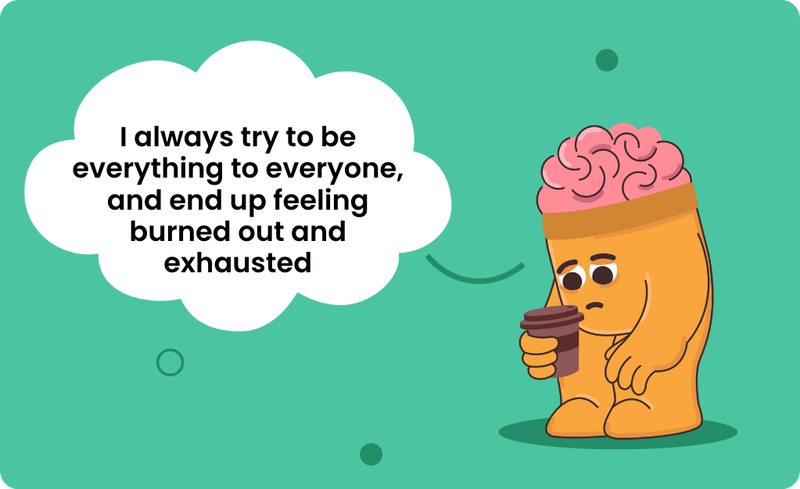Low self-esteem can silently affect many aspects of life, often manifesting in subtle behaviors and feelings. Recognizing these signs is the first step towards self-awareness and improvement.
1. Apologizing Excessively

Apologizing excessively, even for things that aren’t your fault, can be a sign of low self-esteem. You might find yourself saying “sorry” more often than necessary. This behavior often stems from a deep-seated feeling of unworthiness or fear of disapproval.
In social situations, this can manifest as a constant need to smooth things over, even when no offense has been caused. It’s important to recognize this pattern and understand that it’s okay to stand your ground. People with healthy self-esteem know when an apology is warranted and when it’s not.
2. Fear of Criticism

Fear of criticism can paralyze decision-making, leading to avoidance of new challenges. This fear might prevent you from taking risks or speaking up.
When every piece of feedback feels like a personal attack, it could be a reflection of how you view yourself. It becomes a cycle of negative reinforcement, where criticism is feared because it echoes internal self-doubt. Working on separating constructive feedback from personal worth can help break this cycle. Accepting feedback without fear is a sign of healthy self-esteem.
3. Difficulty Accepting Compliments

Struggling to accept compliments can indicate low self-esteem. When someone praises you, dismissing their words or believing they’re insincere might happen often.
This reaction often stems from a belief that you are undeserving of praise or recognition. Instead of accepting compliments graciously, you might downplay your achievements. Learning to simply say “thank you” and believing in the kind words of others can improve self-esteem. Accepting compliments is not arrogance; it’s acknowledging your own worth.
4. Negative Self-Talk

Negative self-talk is a hallmark of low self-esteem. Constantly criticizing yourself, or focusing on failures over successes, can be damaging.
This internal dialogue often amplifies feelings of inadequacy, making even small mistakes feel monumental. The words you say to yourself matter; recognizing and challenging these thoughts is crucial. Replacing negative thoughts with positive affirmations can be transformative. Remember, self-compassion is key to fostering self-esteem. It’s about treating yourself with the kindness you’d offer a friend.
5. Social Withdrawal

Social withdrawal can be a coping mechanism for low self-esteem. Avoiding social interactions might feel safer than facing potential judgment.
However, isolating oneself can exacerbate feelings of loneliness and inadequacy. Engaging with others, even when it feels challenging, can be beneficial. Connections remind us of our value and offer support. Overcoming the urge to withdraw helps build confidence. Remember, everyone has a place in the social world, and you are no exception.
6. Perfectionism

Perfectionism can often mask low self-esteem. Striving for flawlessness might seem admirable, but it often leads to dissatisfaction.
This relentless pursuit can result in burnout and anxiety, as even minor imperfections are seen as failures. Understanding that mistakes are part of learning is crucial. Accepting imperfections as part of the human experience can ease the pressure of perfectionism. Embrace the journey, not just the destination, to nurture self-esteem.
7. People-Pleasing

People-pleasing often indicates low self-esteem. Prioritizing others’ needs over your own might reflect a desire for approval.
This behavior can lead to neglecting personal boundaries and well-being. While helping others is commendable, it’s essential to ensure it’s not at the expense of your own happiness. Set boundaries and learn to say no when necessary. Real friends will respect your limits. True self-esteem respects both self and others.
8. Overly Competitive Behavior

Being overly competitive can be a sign of low self-esteem. The need to win at all costs can mask feelings of inadequacy.
This drive might overshadow the joy of participation and connection with others. It’s important to recognize that worth isn’t tied to victory or superiority over others. Celebrating personal achievements, regardless of the outcome, fosters healthier self-esteem. Remember, competition should enhance growth, not detract from it.
9. Indecisiveness

Indecisiveness can stem from low self-esteem. Doubting your ability to make the right choices can paralyze decision-making processes.
This lack of confidence in your judgment often leads to seeking constant reassurance from others. Building trust in your own instincts and decisions is crucial. Start with small choices to gradually rebuild confidence. Every decision doesn’t have to be perfect; it’s about learning and growing from each experience.
10. Avoiding Eye Contact

Avoiding eye contact can reflect low self-esteem. It might stem from discomfort in social interactions or fear of judgment.
This behavior can create barriers to effective communication and connection. Eye contact conveys confidence and openness, fostering trust. Practicing maintaining eye contact in safe environments can gradually build self-assurance. Remember, everyone appreciates sincerity and presence in interactions.
11. Self-Isolation

Self-isolation is often linked to low self-esteem. Retreating into one’s own space might feel like a safe haven from outside criticism.
However, prolonged isolation can lead to feelings of loneliness and depression. Interaction with others can provide a fresh perspective and remind you of your worth. Balancing solitude and socialization is key to nurturing self-esteem. Remember, the world is richer with you in it.
12. Reluctance to Try New Things

Reluctance to try new things often signals low self-esteem. Fear of failure or judgment can prevent you from stepping out of your comfort zone.
Yet, trying new experiences is how growth happens. Building self-esteem involves embracing new challenges, even when they seem daunting. Each step forward, no matter how small, builds confidence. Remember, it’s about the journey of discovery, not perfection.
13. Comparing Yourself to Others

Constantly comparing yourself to others is a sign of low self-esteem. This comparison often leads to feelings of inadequacy and dissatisfaction.
It’s important to remember that everyone has their own journey and struggles. Focusing on your own path and progress is crucial. Celebrate your achievements and milestones. Self-esteem thrives when you appreciate yourself for who you are, not who others are.
14. Self-Doubt

Persistent self-doubt can cripple self-esteem. Questioning your abilities and worth creates barriers to personal growth.
This internal struggle often leads to missed opportunities and regrets. Building self-esteem involves acknowledging your strengths and achievements. Trust in your capabilities and take pride in your accomplishments. Remember, everyone has doubts, but they shouldn’t define you.
15. Downplaying Achievements

Downplaying achievements is often associated with low self-esteem. When recognition comes, deflecting praise or attributing success to luck might happen.
This mindset diminishes your hard work and worth. Embracing your accomplishments and sharing them with pride fosters healthy self-esteem. Remember, acknowledging your achievements doesn’t diminish humility; it celebrates your journey and efforts.

Mother of three and a primary school teacher. I’ve always loved being around children and helping them, so I chose my path as a teacher. It is sometimes hectic with three children, but I am 100 percent into it and wouldn’t change it for anything in the world.

